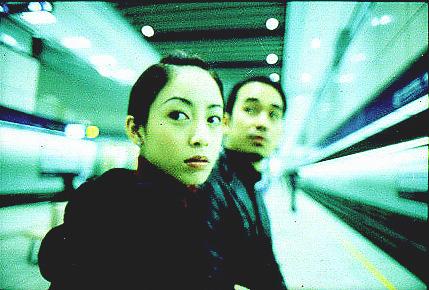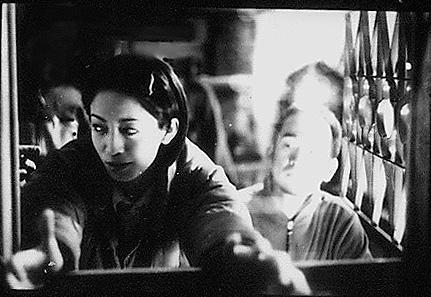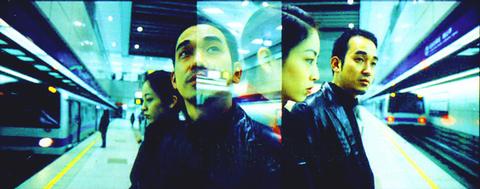Taiwanese filmmaker Hsiao Ya-chuan (
Hsiao is known as one of the best young filmmakers in Taiwan and has taken a large step in broadening his recognition abroad with Mirror Image which was shown in the Directors' Fortnight portion of the Cannes festival.

PHOTO COURTESY OF HSIAO YA-CHUAN
Mirror Image will compete for the Camera d'Or, a prize for first-time feature film directors. And on Saturday Hsiao was awarded the festival's youth award issued by a panel of seven French film critics to recognize films that represent young people's lives and stories.

PHOTO COURTESY OF HSIAO YA-CHUAN
Hsiao has also received funds and promotion plans for Mirror Image and his next two filmmaking projects from French film companies. Celluloid Dreams, which has distributed Tsai Ming-liang's (
Mirror Image involves a game of flirtation between a man and two women in Taipei, each of whom is trying to manipulate the others' fate and lives. Shot in a playful, humorous style with jazzy background music, the story focuses on the main character Tung-chin's (

Tung-chin was recently in a car accident which left him with a scratched palm and was told later by his nurse that without a lifeline on his palm he was now in control of his own fate, something which he has come to believe quite strongly.
Eiko, Tung-chin's girlfriend, is an avid palm reader who hangs out at the pawnshop. The two of them use different ploys to get prints of customers' palms. But the palm lines that Eiko is most interested in is Tung-chin's. She wants to know more about his future. Meanwhile, Tung-chin begins an affair with a female customer named Xiao De-le (
"I think Tung-chin has fooled himself," Hsiao said at a press conference at Cannes last week. "For me a lifeline is meant to be a limit to one's life. And losing his lifeline makes Tung-chin believe in a false idea that he has broken the limits," he said.
"So he is like a guinea pig that I created for my experiment, who in the end reverts back to his original limits, back to an ordinary life."
"This is also true for the two girls, who tried to break free of control in their own different ways but find themselves trapped by their own limits that they set up."
The playful environment that Hsiao portrays in his film through his camera work and humorous story was also a hot topic of discussion at the festival.
"Before I start shooting, I usually have the rhythm and structure of the images in my mind, which I perceive as important elements in my film," Hsiao said.
For Peggy Chiao (
Hou is in fact one of the producers of Mirror Image. Hsiao was previously a student of Hou's and worked as deputy director on Hou's Shanghai Flowers (

In the March 9 edition of the Taipei Times a piece by Ninon Godefroy ran with the headine “The quiet, gentle rhythm of Taiwan.” It started with the line “Taiwan is a small, humble place. There is no Eiffel Tower, no pyramids — no singular attraction that draws the world’s attention.” I laughed out loud at that. This was out of no disrespect for the author or the piece, which made some interesting analogies and good points about how both Din Tai Fung’s and Taiwan Semiconductor Manufacturing Co’s (TSMC, 台積電) meticulous attention to detail and quality are not quite up to

April 21 to April 27 Hsieh Er’s (謝娥) political fortunes were rising fast after she got out of jail and joined the Chinese Nationalist Party (KMT) in December 1945. Not only did she hold key positions in various committees, she was elected the only woman on the Taipei City Council and headed to Nanjing in 1946 as the sole Taiwanese female representative to the National Constituent Assembly. With the support of first lady Soong May-ling (宋美齡), she started the Taipei Women’s Association and Taiwan Provincial Women’s Association, where she

Chinese Nationalist Party (KMT) Chairman Eric Chu (朱立倫) hatched a bold plan to charge forward and seize the initiative when he held a protest in front of the Taipei City Prosecutors’ Office. Though risky, because illegal, its success would help tackle at least six problems facing both himself and the KMT. What he did not see coming was Taipei Mayor Chiang Wan-an (將萬安) tripping him up out of the gate. In spite of Chu being the most consequential and successful KMT chairman since the early 2010s — arguably saving the party from financial ruin and restoring its electoral viability —

It is one of the more remarkable facts of Taiwan history that it was never occupied or claimed by any of the numerous kingdoms of southern China — Han or otherwise — that lay just across the water from it. None of their brilliant ministers ever discovered that Taiwan was a “core interest” of the state whose annexation was “inevitable.” As Paul Kua notes in an excellent monograph laying out how the Portuguese gave Taiwan the name “Formosa,” the first Europeans to express an interest in occupying Taiwan were the Spanish. Tonio Andrade in his seminal work, How Taiwan Became Chinese,